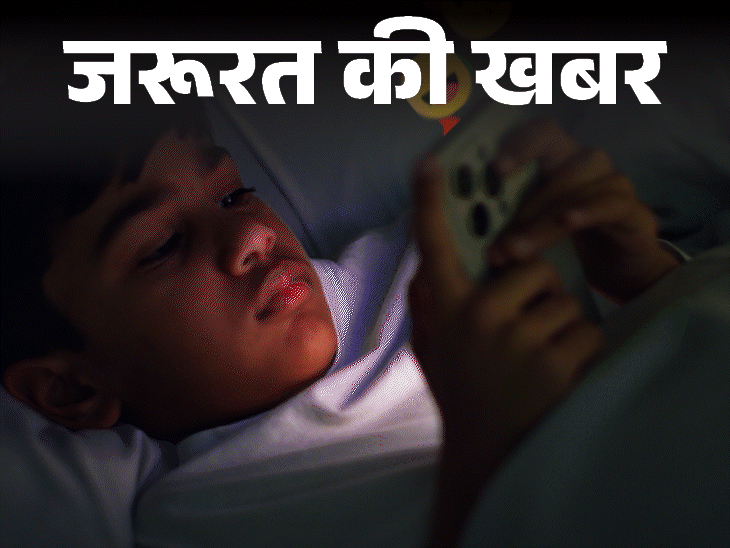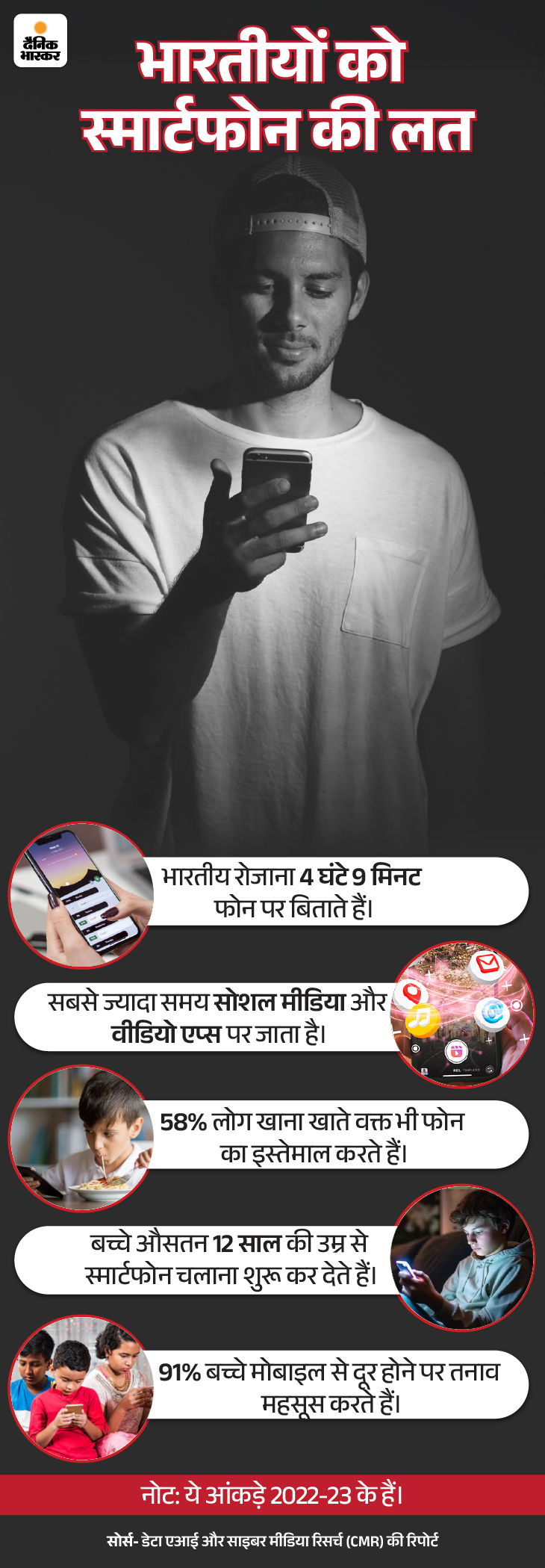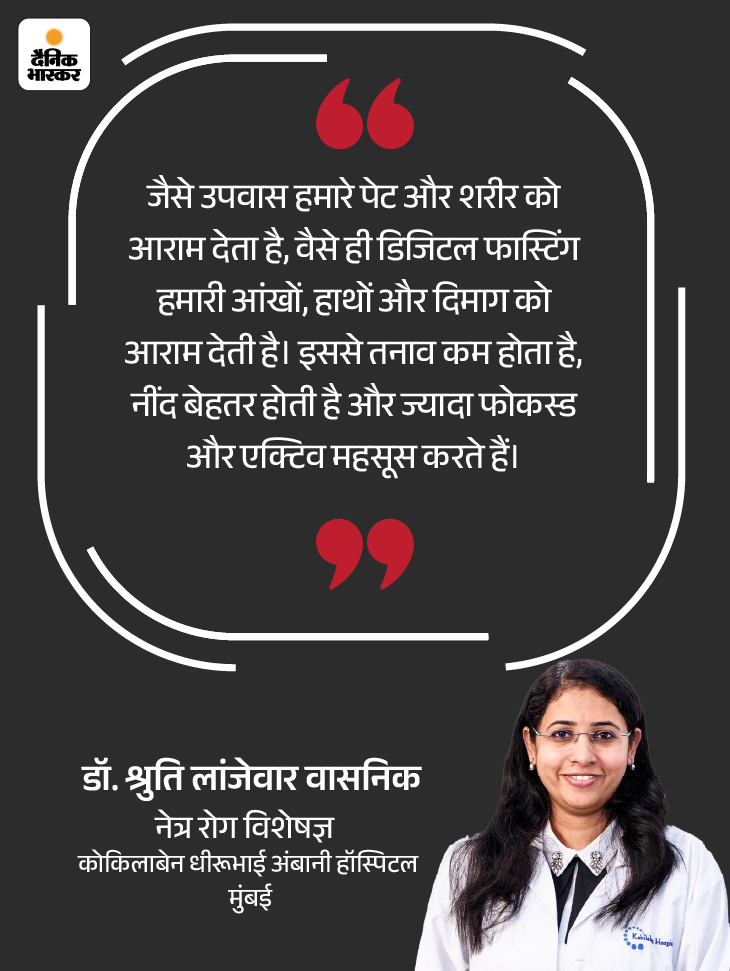A few moments ago
- Copy link

Fast Or the tradition of fasting has been going on for centuries. Fasting is not just the name of being hungry, but is the practice of self -control and controlling itself. Just as the body needs rest from time to time, in today’s digital race, the brain and eyes also need enough rest. ‘Digital fasting’ is an effective method for this. This is a practice that is not only beneficial for the eyes, but also gives new freshness to the mind.
So let’s News of the need I know what is digital intermittent fasting? Will also know that-
- How beneficial is it to adopt it?
Expert: Dr. Shruti Lanjewar Wasnik, Eye Standards, Kokilaben Dhirubhai Ambani Hospital, Mumbai
Question- What is digital intermittent fasting?
answer- Digital intermittent fasting means to make a complete distance from mobile, laptop, TV and other digital screens for some time. Just as we relax from eating the body in fasting, similarly in digital fasting, the eyes and mind get relief from the screen. This reduces the fatigue of the eyes, makes the brain feel active and sleep is also better.
Question- Why is digital intermittent fasting necessary?
answer- In today’s lifestyle, a large part of the day of most people passes on mobile, laptop or TV screen. Whether it is office work, studies or social media, the screen is almost impossible. Reports say that people around the world spend an average of 6 to 7 hours on screen daily. That is, a quarter of the day is given only to mobile and laptop. One of the major reasons for this is social media, video games and the ‘dopamin reward system’ of the Internet, which repeatedly draws the mind towards the screen. The result is that gradually screen addiction becomes our everyday habit.

Question- What kind of harm can be caused by watching the screen for a long time?
answer- If we keep an eye on mobile or laptop throughout the day, then it has a direct effect on the eyes and mind. Eye disease specialist Dr. Shruti Lanjewar Wasnik says that people who see the screen for 6–7 hours daily, have problems like eye fatigue, sleep deficiency and stress. In the graphic below, you can see how many hours watching the screen can cause problems.

Question- How can digital intermittent fasting gradually add to lifestyle?
answer- Digital intrustant fasting can be difficult to adopt completely, so it is necessary to gradually make it a part of its routine. For this, start with small changes. Ophthalmologist Dr. Shruti Lanjwar Wasnik says that after waking up in the morning, do not see the mobile at least half an hour and turn off the phone 1 hour before sleeping at night. Initially, make a habit of distance from just 1–2 hours a day and gradually increase this time. One day a week, a complete distance from social media is the easiest and effective way to relax the eyes and keep the mind fresh.

Question- Should digital intermittent fasting be different for children and elders?
answer- The needs and screen time of children and elders are both different. Screen more than 1–2 hours daily can be harmful for young children. At the same time, it is natural for the elders to have a slightly high screen time due to work and studies, but they also need regular brakes and digital intermittent fasting.
For children
Children’s body and brain are in a state of development, so they come quickly under the influence of the screen. Watching mobile or TV for a long time brings problems like fatigue in their eyes, deteriorating sleep and low attention in studies. Therefore, it is necessary for children to have strict rules not to use screens more than 1–2 hours daily.
For adults
The use of screens for adults is sometimes part of work and studies, but being continuously on screen increases problems like headache, stress and sleep deficiency. Therefore, it is best to give rest by keeping yourself away from the digital device as much as possible.
Question- Can people working in the office also do digital intermittent fasting?
answer- It is not easy to distance the entire screen in the office, but digital intermittent fasting is possible by taking small brakes and adopting the right methods. Dr. Shruti Lanjwar Wasnik says that it is challenging for office workers to continuously work on laptops, but if the laptop is at the right height and kept at the right distance from the eyes, then the problem can be reduced to a great extent. Along with this, 20-20-20 rules are very effective. That is, look at an object 20 feet away every 20 minutes for 20 seconds. This reduces the fatigue of the eyes and also gives a break to the brain.

Question- Can adopting digital intermittent fasting increase productivity?
answer- Yes, the focus on making distance from the screen is more focused. This increases the focus in studies and work, enhances creativity and prevention from brain fetch caused by watching the screen for a long time.
,
Read this news too…
News of the need- Video of washing eyes with urine viral: Doctor’s warning, do not take medical advice from social media, listen to experts

Recently, a shocking video went viral on social media. In this video, a woman from Pune, who describes herself as ‘Medicine Free Life Coach’, is seen washing her eyes with her own urin. He claims that this process relieves problems like dryness, irritation and redness of the eyes. Read full news …



